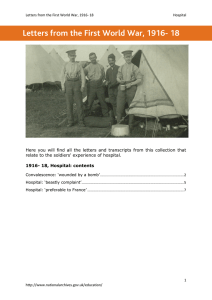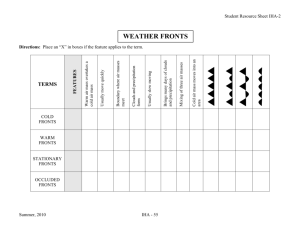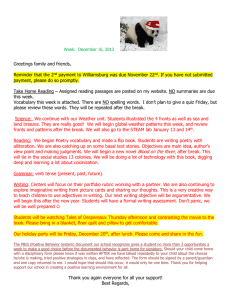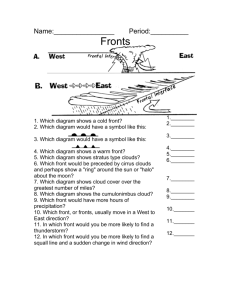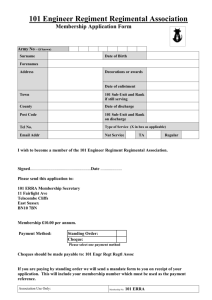Letters from the First World War, 1916- 18
advertisement
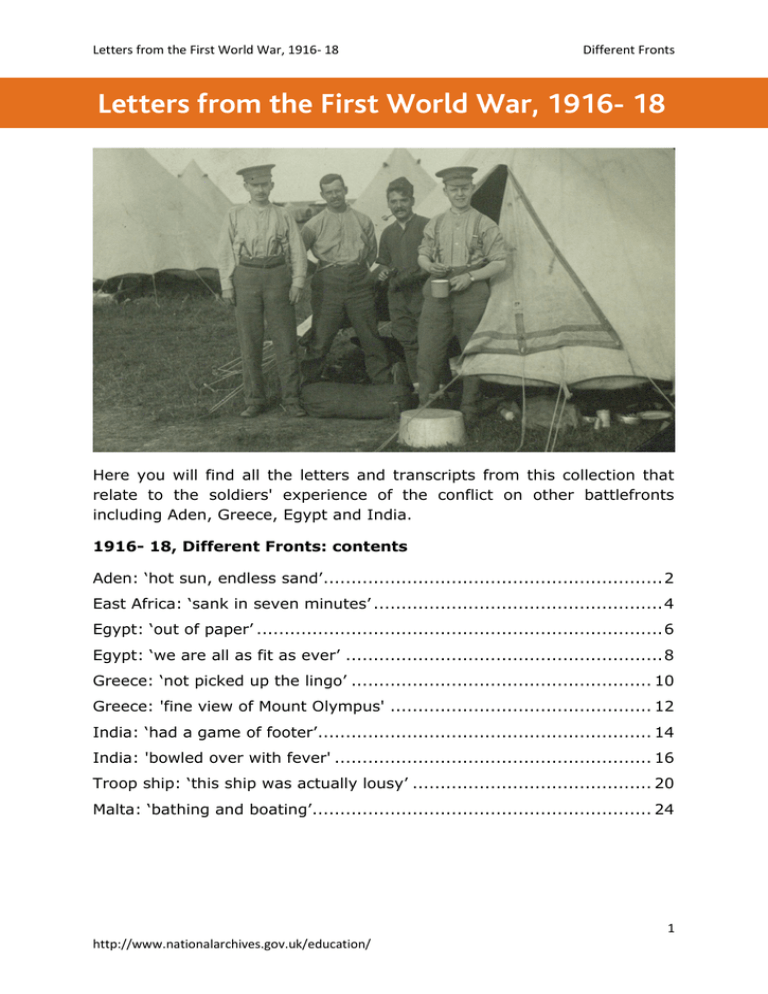
Letters from the First World War, 1916- 18 Different Fronts Letters from the First World War, 1916- 18 Here you will find all the letters and transcripts from this collection that relate to the soldiers' experience of the conflict on other battlefronts including Aden, Greece, Egypt and India. 1916- 18, Different Fronts: contents Aden: ‘hot sun, endless sand’ ............................................................. 2 East Africa: ‘sank in seven minutes’ .................................................... 4 Egypt: ‘out of paper’ ......................................................................... 6 Egypt: ‘we are all as fit as ever’ ......................................................... 8 Greece: ‘not picked up the lingo’ ...................................................... 10 Greece: 'fine view of Mount Olympus' ............................................... 12 India: ‘had a game of footer’ ............................................................ 14 India: 'bowled over with fever' ......................................................... 16 Troop ship: ‘this ship was actually lousy’ ........................................... 20 Malta: ‘bathing and boating’............................................................. 24 1 http://www.nationalarchives.gov.uk/education/ Letters from the First World War, 1916- 18 Different Fronts Aden: ‘hot sun, endless sand’ Harry Beaumont, 2 March 1917, Aratia, Yemen, Born: 17 October 1873, Regiment: 1/6 East Surrey Regiment, Regiment number: 2297, Rank: Quarter Master Sergeant, Died: 1952 Transcript Dear Bertie, Many thanks for your long and interesting letter, which has now reached me, I will to it at length at a more opportune moment. As you will see by above address I have left India. The regiment left the N.W. Indian frontier in January where the winter had been bitterly cold 2 http://www.nationalarchives.gov.uk/education/ Letters from the First World War, 1916- 18 Different Fronts and embarked at Karachi after a three day’s train journey, then six day’s most pleasant voyage to Aden where we landed and now join part of the Aden Field Force. I have been stationed with a strong detachment on the desert in close proximity to a Turkish force who frequently shelled us, but without any material damage. The heat after the cold winter in India is very trying, scorching hot sun, endless sand and myriads of torturing flies. Life is very different here as compared to India. I never pictured myself riding across the Arabian dessert on a camel. Am pleased to say I am splendidly fit and well, but should be glad when the struggle is over and hope I shall be amongst those who return home safely. Trusting you are well. Best of wishes, kind regards to the remnants of the Audit staff. Yours most sincerely Harry Beaumont 3 http://www.nationalarchives.gov.uk/education/ Letters from the First World War, 1916- 18 Different Fronts East Africa: ‘sank in seven minutes’ Frederick Jarrett, photographs, a typed extract and an account, AugustNovember 1916. Born: 10 June 1891, Regiment: East African Mounted Rifles Transcripts Photograph caption (left) Fred Jarrett (late of Stats. Dept) has seen field service in East Africa and ranks as a First Class Warrant Officer. He left England March 10th 1913 with Arthur Shipley of the Goods, who has also seen service with the East African Mounted Rifles. Both hope to be home on leave in the near future. (Since receiving this report, Fred has arrived in England on leave) 4 http://www.nationalarchives.gov.uk/education/ Letters from the First World War, 1916- 18 Different Fronts Extract of office newsletter (top right) Frederick Jarrett late of the Stats. Dept. who took part in the East African campaign in the early stages of the war was returning from leave in England, and left London on October 11th. At 7.40am, on October 20ththe boat was torpedoed without warning in the Mediterranean and sank in seven minutes, but fortunately all passengers were saved being picked up by French torpedo boat although all baggage and cargo were lost. Fred states that he lost all he possessed with the exception of a pair of pyjamas (in which he had to take a lifeboat) his raincoat and wallet, and that the whole affair seems like a dream now but was real enough at the time. The passengers were landed in Algeria where they were well treated, and subsequently returned to England over land via Marseilles. He will make another attempt to dodge the submarines on November 18th when he sails for Mombassa on the Balmoral Castle via the Cape, there being too much excitement in the Mediterranean at present. Extract of office newsletter (bottom right) … Fred Jarrett, late of Stats. Dept. sends two interesting Photos of himself and herein can be seen a little account of his doings abroad with his friend Arthur Shipley, brother of our late colleague George Shipley. 5 http://www.nationalarchives.gov.uk/education/ Letters from the First World War, 1916- 18 Different Fronts Egypt: ‘out of paper’ Henry Bullen, 24 July 1916, Egypt. Born: 25 April 1893, Regiment: 2/10 Middlesex regiment, Regiment number: 2858, Rank: Private, Died: 1942 Transcript An employee at the Audit office added the following note at the top of the letter: Private H. Bullen, late of the Passengers dept, went through 11 months of Dardanelles campaign… Later moved to Malta, then to Egypt and Aden. Now encamped near Mount Sinai. Dear Percy, …I am sorry I have been so long replying to your letter, but I have had my hands rather full just lately, so hope you will not mind. As I cannot get at my kit bag at present I shall only be able to write you a short letter because I have nearly run out of paper envelopes, so I shall have to make up for it next time. 6 http://www.nationalarchives.gov.uk/education/ Letters from the First World War, 1916- 18 Different Fronts Well my dear Percy I am glad to know yourself and all at home are in the best of health and please convey to your father and mother my appreciation of their good wishes sent to me. I received your previous budget, but it arrived after I sent you the field postcard, my word it must take you a good time to write all those sheets of foolscap, but I delight in reading them, since being out here I find I cannot write an interesting letter. I am afraid my letters must often bore you, I have read your letter carefully and noted all the news about the office and some of our friends who are doing their share overseas, but the chief item you mention is poor old Rippington, it is the first time I have heard about him, poor old chap. I guess he was pleased to see you and I am sure it was an excellent idea of yours to send him some luxuries in the way of food with the proceeds of the money you collected for him at the office. I sincerely hope our friends out in France will come out of the terrible ordeal safely, I note that Bob Court and several others have gone and my brother has been out there some weeks now, also I have two cousins who have been out there some considerable time and been in the thick of the fighting, I hope the advance will mean the rounding up of the Huns and from the latest news received here everything seems to be going well at present, am looking forward to seeing the office soon… We are not having such an easy time as one would imagine, the heat is still very intense and the flies very troublesome and we have anything from an elephant to a cockroach creeping over our blankets at night time; the chameleon is our chief pet and will crawl over one’s body just like a tame mouse and the different colours they can change their body to suit the thing they settle on is wonderful. Now I must close Percy as you will see the paper is nearly filled up, so hope you will not mind this time, please remember me to all at home and all inquiring friends… With best wishes… Private H. Bullen 7 http://www.nationalarchives.gov.uk/education/ Letters from the First World War, 1916- 18 Different Fronts Egypt: ‘we are all as fit as ever’ Harold William Cronin, 18 January 1916, Egypt. Born: 9 May 1880, Regiment: 4th Seaforth Highlanders; promoted to Lieutenant in 5th Bedfordshire Regiment on 20 May 1915, Died: 2 December 1917 at 35 Casualty Clearing Station in Palestine, leaving £268 19s to his widow Transcript Dear Mr Welsh, A lot has happened since I last wrote to you and we have moved, and moved, and moved again, and still we are moving. There is nothing at all to say about the actual coming off. We were told to pack up, and having 8 http://www.nationalarchives.gov.uk/education/ Letters from the First World War, 1916- 18 Different Fronts done so, were marched off and soon afterwards were making up a four for Bridge in quite a comfortable cabin and enjoying the unwanted luxury of electric light. The only thing that struck one in coming away was that nothing had altered and it might easily have been the night I landed. The same old beach apparently full up with boxes of bully beef, tinned milk and jam, the same old destroyer, with its search light playing on the shore, keeping up its systematic bombardment and the same old swish of bullets around and dropping into the water. No sooner was Christmas here than we were packing up again, to come on here. A large town a few miles on the interior, it is a filthy rotten smelly hole and we always carried loaded revolvers and walked about in batches and were never out after dark. Probably the people are not ill disposed to us but some of them looked pretty villainous and it was better to be on the safe side… We have had quite a good time and the regular hours and regular meals have backed everyone up well and now we are all as fit as everapparently. Thanks very much for the Xmas card it was a bit late but then all our Xmas letters and parcels were on account of the way we have been moving about; we lost a good mail, too, on the Persia (S.S. Persia, which was torpedoed and sunk in December 1915). I am enclosing a few photos that might be of interest to you. I have some more snaps coming later on and will let you have some if they turn out to be any good. With kind regards. Yours sincerely, H.W. Cronin 9 http://www.nationalarchives.gov.uk/education/ Letters from the First World War, 1916- 18 Different Fronts Greece: ‘not picked up the lingo’ Francis Witt, 28 May 1916, Salonika, Greece. Born: 8 February 1893, Regiment: Royal Engineers, Mediterranean Expeditionary Force; transferred to Office of Superintendent of 1914, Regiment Line on 15 June number: 138069; WR296343, Rank: Sapper, Died: 1970 Transcript Dear G. [Mr Burgoyne], I guess you wonder what has become of me after this long silence, but you will see I am a good distance away from the homeland now. I arrived here early in April and since the start have been getting on quite well. You may be interested to know that Gray from your department is also here. It is rather strange that I should rub against him. The weather is brilliant, cloudless skies day after day, but it is very hot. There are plenty of mosquitoes about. They are very tantalising. A net is practically a necessity for sleeping purposes. I am billeted in a warehouse, 10 http://www.nationalarchives.gov.uk/education/ Letters from the First World War, 1916- 18 Different Fronts it is a very old place, and has stood hundreds of years. I should think, according to its general appearance. I have not picked up the lingo yet, but French is chiefly spoken, and I much regret not having studied it more when I had the opportunity at home. This town is a queer sort of place as compared with some of the French towns we know, and am sure I shall not wish to see it again when once I leave. The cafés are not so gay as the French, but I manage to have fun occasionally. We have got a piano and gramophone to amuse ourselves with. I hope we shall be able to have another trip to Paris, when the war has cleared up, but of course when is a question nobody can answer yet awhile. Shall be very pleased to hear some news of you, and conclude now with all the best. Yours sincerely, Frank. 11 http://www.nationalarchives.gov.uk/education/ Letters from the First World War, 1916- 18 Different Fronts Greece: 'fine view of Mount Olympus' David Joseph Robertson, 21 April 1916, Salonika, Greece. Born: 5 January 1877, Regiment: Railway Troop, Royal Engineers, Regiment number: 138054, Rank: Sapper, Returned to office: 5 May 1919 Transcript Dear Mr Wood, Just a few lines to let you know I arrived safely after visiting several places which I am not allowed to mention. This place is quite oriental as the fronts of the houses are for the most part looked after and kept in repair, while the backs are allowed to go, and it gives one a shock to see a fine building in the front, and then to go to the back and see it all neglected and ready to fall down. It is very hot here during the day and the swarms of flies and mosquitoes keep one very busy and I dread to think what it will be like in the summer. It seems strange to see oxen drawing carts and donkeys with packs on, but it is a very common sight here. I sometimes have to go to the big steamers in a small pinnace [ship’s boat] and when it is rough it requires some nerve to walk along the sides of barges that are pitching and tossing and then climb up the 12 http://www.nationalarchives.gov.uk/education/ Letters from the First World War, 1916- 18 Different Fronts ship’s side by a rope ladder, but it comes easier in time. It is very mountainous here, and we get a very fine view of Mount Olympus and the snow-capped peaks. I had to go by motor up country the other day and I had to grip the side of the car as the roads are awful and sometimes there is only just room for the car to travel and a sheer drop on the other side. The labourers at the docks are Greeks and when they are taken on in the mornings it is a regular Babel ‘till the Military Policeman uses his persuader (truncheon) right and left and that calms them somewhat. I have not met Mr Cox’s son yet but should I do so I will make myself known to him. I have had to revert to sapper again as there are not sufficient men of our staff for us to remain N.C.O.s but if it is brought up to strength I am promised them again. The first person I saw here was Gray of the Stats (Statistical Department), and we are working together. Trusting that you are quite well and with kindest regards to Messrs Cox, Slater, Rogers and Hunt. Am yours obediently, D.J. Robertson 13 http://www.nationalarchives.gov.uk/education/ Letters from the First World War, 1916- 18 Different Fronts India: ‘had a game of footer’ James Walter Hyam, 15 April 1918, Roorkee, India. Born: 24 July 1891, Regiment: 11 Hussars, C. Squadron; Royal Field Artillery; Royal Garrison Artillery, Regiment number: 223725; 184963, Rank: Gunner, Died: 1951 When James Hyam, also nick-named Fatty, wrote from India he used these three postcards which showed different scenes from Alexandria in Egypt where he had ‘a grand time’ en-route to India. Transcript My Dear Bertie, Have arrived in India for the purpose of relieving some A1 (military fitness category meaning capable of active service overseas) men here who have been here for a long period. It’s not a bad show here just above Delhi but so d____d hot: risen to 106 degrees in the shade and we have more hot weather just coming. Our parades are as follows 6.30-7.45 and 9 to 10 and finish for day. There is an abundance of sport and grub here. 14 http://www.nationalarchives.gov.uk/education/ Letters from the First World War, 1916- 18 Different Fronts Fancy getting eggs laid too. A supper of say ½ new mutton chop, potatoes, peas, broccoli and tea 4d. The things that are expensive are goods from England especially English soap, sauces, writing paper and of course we are unable to get English made fags. We had a grand journey from England; route was Southampton to Cherbourg then to Italy. In Italy we went to Alexandria, stayed there three days had a grand time, streets of red lamps etc. and lovely shops. No two houses in main stretch are alike. Then from Alexandria we come to Port Suez by train then on P. and O. Liner Kaiser I. Hind to Bombay had two days there and that’s a grand place too, lovely wide streets and grand buildings. They have a sea front very much like Hastings and all the big boys have their after dinner drive there and form a queue by shore. Some stuff there too. Lots of Europeans knocking about too. Had a game of footer for the Railway Operatives depot last night, 6pm, with King’s Own and won… But it was so ruddy warm and I felt like a wash out at finish. Kind regards to all. Give Bill Butler my address and ask him to drop a line. J.W. Hyam, Fatty. How are the tours going is Frosty still serving? 15 http://www.nationalarchives.gov.uk/education/ Letters from the First World War, 1916- 18 Different Fronts India: 'bowled over with fever' Harry Beaumont, 18 August 1916, Rawalpindi, India. Born: 17 October 1873, Regiment: 1/6 East Surrey Regiment, Regiment number: 2297, Rank: Quarter Master Sergeant, Died: 1952 Transcript Dear Bertie, Just a few lines to let you know how we are getting on out here, I forgot when I last wrote you last and what news I told you. We marched down from the hills, 9,000 feet up in the Himalaya Mountains last October to Rawalpindi, then shortly afterwards out to camp returning just before Xmas. In February I obtained a furlough and had a fine tour of places of 16 http://www.nationalarchives.gov.uk/education/ Letters from the First World War, 1916- 18 Different Fronts interest, down to Delhi then right across India to Calcutta, had several letters of introduction from brother Freemasons to awfully nice people there and had a most enjoyable time, spent a few days at Agra on the return journey, travelled roughly just over 3,000 miles with several nights in the train. A few days after returning the regiment was placed under orders to march 83 miles to Noushera on the frontier border, where over 10,000 British and native troops were concentrated, a similar number at Peshawar farther down the frontier, in readiness for threatened trouble with the Afghans, whom German intriguers had been amongst. Noushera was a cruel place, nothing but a dust heap at the foot of the mountain. We spent several weeks there, training in mountain warfare, my word, it was chronic, the terrific heat and the awful climbing for miles day after day, with all transport on mules and camels through the rocky mountain passes. At one bivouac we encountered bad water, and about forty of our fellows went down with enteric fever [typhoid]. One died, but the others pulled through as they had been inoculated; a wonderful thing inoculation has proved to be in India. Well in spite of the hard time, we returned to Rawalpindi in fine condition after the Afghan trouble had subsided for the time being, it is always liable to break out at any moment and we are always in readiness to move at any time. Then we changed to another barracks in Rawalpindi in April, and have been stationed on the plains all the summer. The heat has been intense; one never goes outside after 10am; after tiffin at 1 o’clock the barracks and in fact everywhere is dead to the world until between 5 and 6pm, when sports such as tennis, cricket hockey and swimming at the baths are possible. Every soldier has a punkah (fan) swinging over his bed all night and during the hours off duty during the day. Many men sleep out on the barrack square on their beds at night. During the past few weeks the monsoon has been on, with torrential rain which I would fail to describe. Now the intense heat of the sun is draining the moisture out of the earth with the result that it is like living in the moist fern house at Kew 17 http://www.nationalarchives.gov.uk/education/ Letters from the First World War, 1916- 18 Different Fronts Gardens, only worse, and many men are being bowled over with fever. Ever since arriving at India, getting on for two years ago, I have been as fit as a fiddle and enjoyed exceptional health, until a fortnight ago, when I was suddenly taken ill with sandfly fever, a most painful, lowering form of fever, and was carried to hospital and also found to be suffering from pleurisy. I was in bed several days subsisting on a small quantity of milk with the result that when I was allowed to get up I was too weak to stand. I was discharged after ten days and am getting on quite alright now, and am leaving on next furlough to a hill station in the Himalayas shortly to recuperate. In November we are on the move again, marching about 80 miles to a big camp, for manoeuvres of several weeks, returning again just before Christmas. But marching eighty miles in five days under an Indian sun is very different to cloudy England. Every regiment in India, both regular and territorial, is being heavily reinforced by drafts from England. We have had three drafts one consisting of nearly 300 men, then another of 67, now another of 84, bringing us up to nearly 1,100 men. There are thousands of British troops, mostly Terriers (members of the Territorial army) (there are only eight regular infantry regiments left in India) stationed at various frontier places, and all sorts of rumours prevalent about a big expedition moving during the next few months, all possible preparations are being made for it, well, if the Indian govt. make as disastrous a muddle of it when the fighting does come off as they made over the Mesopotamia campaign, then with foes like the ferocious Afghans there will be a terrible price to pay in life, for the country and the terrific heat will be enough without having to fight every inch of the way. I had a very interesting letter from Mr Wood some time ago which I answered recently, also had one from Mr Price a few days ago. I can quite picture the changes which must have occurred in the staff of the Audit since I left. Of course you are over the age limit, so have not been called upon. I expect if, and when, I do return safely that life in England will seem very different under the altered conditions. I shall be glad to get home again and only wish I could see a prospect of doing so, with the conclusion of this terrible war. I have had a very enjoyable time in India (apart from soldiering which I always did enjoy, although I think I have had sufficient now) having made the acquaintance of awfully nice 18 http://www.nationalarchives.gov.uk/education/ Letters from the First World War, 1916- 18 Different Fronts residents in ‘Pindi, and by virtue of rank, being allowed the privilege of wearing mufti makes it so much more comfortable when going out of barracks than being in a tight uniform in the climate. I hear regularly from my wife and little one every week. Am glad to say they are well. Please convey my kind regards to all those left in the office that I know. Trusting you are all fit and well and that we shall meet again before many more months elapse. With best wishes Yours most sincerely Harry Beaumont 19 http://www.nationalarchives.gov.uk/education/ Letters from the First World War, 1916- 18 Different Fronts Troop ship: ‘this ship was actually lousy’ Kenneth William Sharland, 26 July 1917, Pashan Camp, Kirkee, India. Born: 25 September 1888, Regiment: 1/6 East Surrey Regiment; Bedfordshire Regiment; Bedfordshire and Hertfordshire Regiment, Regiment number: 34173; 32376, Rank: Private, Died: JanMar 1967 Transcript My dear Mr Biggs The writing mood is on me so I take the opportunity to send you a few lines to let you know how I am getting on, at the same time hoping that at some future date I may have the pleasure of hearing from you. Your letter is bound to be very interesting to me as I have not seen or heard from anybody at Paddington for over six months. 20 http://www.nationalarchives.gov.uk/education/ Letters from the First World War, 1916- 18 Different Fronts I left Aldershot on March 16th and travelled as far as Durban via Sierra Leone and Cape Town on the White Star Liner Suevic. This part of the journey was delightful, the food and accommodation was very good for a troopship. Of course this is accounted for by the fact that it is an Australian troopship. Everything was done that could be to make the journey enjoyable for the one thousand seven hundred men on board. We stayed just outside Sierre Leone for three days but were not allowed to leave. We arrived at Cape Town on Saturday afternoon four weeks after leaving Keyham and had a route march round the town the same evening. The next day we were allowed to roam about at will all day and a right jolly time we had although it was very hot indeed for winter. Cape Town is a beautiful place and the inhabitants made our visit very enjoyable. The patriotism of the South African is wonderful to us after the coolness of the English (especially Aldershot). On the Monday we sailed for Durban arriving there on the Thursday evening after a rather rough journey round the Cape. We did not land till the Saturday afternoon and then bid goodbye to theSuevic. She went on to Australia. We had two weeks at Durban and had a glorious time in a rest camp on Ocean Beach. Every day we went bathing and only had parades up to 12 noon each day. The trams were free to us all over the city and invitations were showered upon us by the English residents. You can rest assured that we were very sorry to leave such a delightful spot, still all good things come to end and we finally had to go on board the Laconia belonging to the Cunard company for four weeks’ misery, we lay in the harbour for one week longing to go ashore before we started on the last stage of our journey to India. This ship was actually lousy (infested with lice) and we had to put up with a shirt inspection every day. The food was bad and very little of it and to back it all up the canteen was rotten as well. I was glad to get to Bombay and get off such a rotten ship. I lost a stone in weight during that four weeks. We arrived in India during the monsoon period and have had plenty of rain more than we like I can assure you. 21 http://www.nationalarchives.gov.uk/education/ Letters from the First World War, 1916- 18 Different Fronts Kirkee is only about hundred miles from Bombay and is about six thousand feet above the sea. We will while here never have the extremes of weather as the climatic conditions are considered to be ideal here. Strange as it may seem to English people native women do most of the work here, and actually act as bricklayers’ labourers carrying pans of ‘mortar’ on their heads, the men do very little indeed. Sunday is the same as any other day to them. As they have their own religious days when they have what they call Ram Jamees. All cartage is done by oxen and is rather slow and cumbersome. Kirkee Bazar is about three quarters of an hour’s walk from Pashan Camp and is rather interesting but is very dirty, children run about naked and the drainage and dwellings are very bad indeed. Cigarettes made by the Turkish tobacco company Bandra can obtained for eleven annas (former unit of Indian currency) per 100 (eleven pence) and are very good indeed, being better than the Nebka. Poona is the nearest city and is about five miles away. I walked there last Thursday to have a look round, this place boasts of one or two hotels and an Italian restaurant but is otherwise an exact counterpart of Kirkee and quite as dirty. The Italian restaurant is very good and is quite the equal of most London restaurants. We do not receive a very many letters out here, as the mail is so uncertain, we never know when the next one will arrive. When you are writing you must let me know all the news, I wonder whether your section will ever be established again as it was before. Since I came out here I have taken up signalling and find it very useful, there is just a possibility I might be able to learn wireless, if so I don’t doubt that it might be useful to me, when we get back to Blighty if there is half a chance to do so I will cease it. Our Battalion is at Aden and unless the signalling alters my destination I will eventually find myself there. It is not exactly the place I should choose if I had my own way but of course there is no choice about it. 22 http://www.nationalarchives.gov.uk/education/ Letters from the First World War, 1916- 18 Different Fronts Well I think I have given you all the news now and am sure you are tired of reading this letter by now, so will close with best wishes to you all from, yours sincerely, Kenneth W. Sharland 23 http://www.nationalarchives.gov.uk/education/ Letters from the First World War, 1916- 18 Different Fronts Malta: ‘bathing and boating’ James Claude Kibblewhite, 1 September 1917, Malta. Born: 14 June 1895, Regiment: 2/13 Battalion London Regiment, Regiment number: 490602, Rank: Sergeant, Died: 20 December 1951 Transcript Dear Sir, I trust you will excuse the liberty I have taken in writing you, after such a long absence from England, but the difficulties of active service is my excuse, although I am sorry to say laziness has a lot to do with it. No doubt you will wonder what I am doing wasting my time in Malta; well, I came here last January through an attack of dysentery followed by constipation, there I remained, and am likely to do so, unless something very unexpected happens. I have been taken on the temporary staff, and am acting as parade staff sergeant, quite a nice easy position, except when we are receiving or sending troops away. How are things in general, looking at Paddington, I suppose the office is full of ladies and men who are over the age limit. 24 http://www.nationalarchives.gov.uk/education/ Letters from the First World War, 1916- 18 Different Fronts I saw a Great Western Magazine a few days ago, and I noticed that a large number of the ‘chiefs’ have retired, also that Artlett has not given up trying to bring sports honours to the Audit with the Bowls team. The weather here is absolutely glorious, and our camp is right against the sea, we get some lovely bathing and boating, in fact it is almost as good as any resort in England. We are about ten miles from Valletta, but we can always get a ride in a motor lorry or a gharry (horse-drawn cab) I have only met one G.W. man since I have been here and that is Cowles of the Agreements. He has been here since the Dardanelles; and he is acting chief clerk to the commanding officer of the Company Camp… I have not given up hope of getting to England yet, as since I have been here I have contracted malaria, also my heart is not good enough to allow me to carry a pack for a while, so I have been marked unfit for over three months, and I may give you all a surprise by walking into the office one of these fine days. Well, sir, when is the war going to end, I think it would have been all over now, bar the shouting, if it had not been for Russia. I think the Great Western Railway according to the magazine have reaped a fair share of the awards for bravery etc, on the field. Well, sir, I trust it will not be long before I have the pleasure of receiving a reply to my letter, and kindly remember me to all that are left of the old room 19… I am, Sir, Yours respectfully, J.C. Kibblewhite Sgt. 25 http://www.nationalarchives.gov.uk/education/
